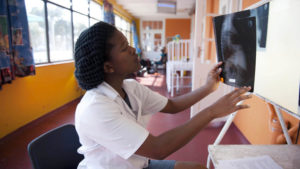
 “Where are the black experts? The few we have in the health sector are rarely quoted in the media.” (David Harrison)
11 AUG 2017 00:00 PONTSHO PILANE
It’s not right that only black voices in health stories are those patients. Black medical researchers must also be heard in the media space.
COMMENT
On a typical day in the Bhekisisa newsroom, I’m working on a story that requires me to talk to an expert who will explain and contextualise the complicated science and policy matters we report on. It’s an important part of our evidence-based reporting, these interviews. Whether it is a story looking at the latest HIV policies or the best way to deliver a baby, I rely on the expertise of health professionals to help me to get my facts right.
But in my year as a health reporter, I have been alarmed by one particular aspect of these interactions: the lack of diversity among experts in the health sector. Most of them are white–in a country where, according to Statistics South Africa (Stats SA), 81% of the population is black.
Transformation–or the lack thereof–is, of course, common in all sectors of our country. In my experience, it is mostly white women who head up nongovernmental health organisations and research institutes. It is rare to find black people, particularly black women, in senior positions in such institutions.
It’s not surprising. Apartheid made it much easier for white people than their black peers to access good education. In 2000, the number of black South African women graduating with PhDs stood at a mere 26, according to a 2015 paper commissioned by the Centre for Higher Education Transformation.
The 2016 National Survey of Research and Experimental Development found that there were about 2 100 black female researchers in the country in the 2013-2014 period. Compare that with the 5 000-odd white women PhD graduates in the same year. White people represent only 8% of the population, according to Stats SA.
It’s been 23 years since South Africa had its first democratic elections. Where are the black experts? The few we have in the health sector are rarely quoted in the media.
Each year, the Mail & Guardian publishes a list of 200 of the country’s brightest young minds. The 2017 Young South Africans included 22 health experts, 12 of whom were black. Cardiologist Nqoba Tsabedze is researching what makes sudden heart failure prevalent among black South Africans and Salome Maswime completed her PhD on how Caesarean sections contribute to maternal deaths in South Africa.
But I rarely see their names in the media. And it’s not new.
In his recently released book, Get Up! Stand Up! Personal Journeys towards Social Justice, HIV activist Mark Heywood highlights the lack of diversity and representation in the media’s reporting in the late 1990s and early 2000s on South Africa’s fight for access to free HIV treatment in the public health sector.
Poor black women continue to be disproportionately infected with HIV, the latest Human Sciences Research Council (HSRC) national HIV household survey found in 2012. They played a leading role in the Aids struggle but are rarely given a voice.
Instead, Heywood, who headed up the Aids Law Project at the time and was also a founding member of the Treatment Action Campaign lobby group, and fellow HIV activist Zackie Achmat, spoke for them.
Heywood writes: “As a result, the real heroes of the TAC struggle are still largely unknown. The stories we were telling second-hand should have been sought from and told by women like Sarah [Hlalele], Vuyiseka Dubula, Busisiwe Maqongo, Hazel Tau, Joanna Ncala, Portia Serote, Linda Mafu, Portia Ncgaba and many, many others.”
Heywood argues that, because he and Achmat were media savvy and knew how to talk in “sound bites”, they ended up being two of the main faces of the HIV struggle.
Studies show that black people are the most affected by health conditions, often because of poverty. For example, South Africa had almost 500 000 new HIV infections in 2012, the latest HSRC household survey reports. About a quarter of the new HIV infections occur among women aged from 15 to 24. Most of them are black.
Because of situations like these, many clinical trials are conducted in black communities. But it can’t stop there. Black people can’t only be the subjects in those studies. We need black researchers too. Similarly, the only black voices in health stories can’t just be patients. The experts we have also need to be heard.
Criticising the underrepresentation of black experts doesn’t mean that reporters should prioritise diversity over talent and knowledge. But it does point to a deep need for health organisations to develop black experts and give media training to those we already have.
It also means we, as journalists, must make it our responsibility to find experts who are not the usual go-to people within our industries.
This requires everyone to go the extra mile. Transformation doesn’t happen naturally. It should be intentional and direct.
http://bhekisisa.org/article/2017-08-11-00-black-experts-in-the-health-sector-where-are-they

